Best Roland digital pianos 2025: Our top pick of digital pianos from across the full Roland range
Bag yourself the ultimate digital playing experience with these top-rated Roland pianos - featuring units from the F, HP, LX and GP series
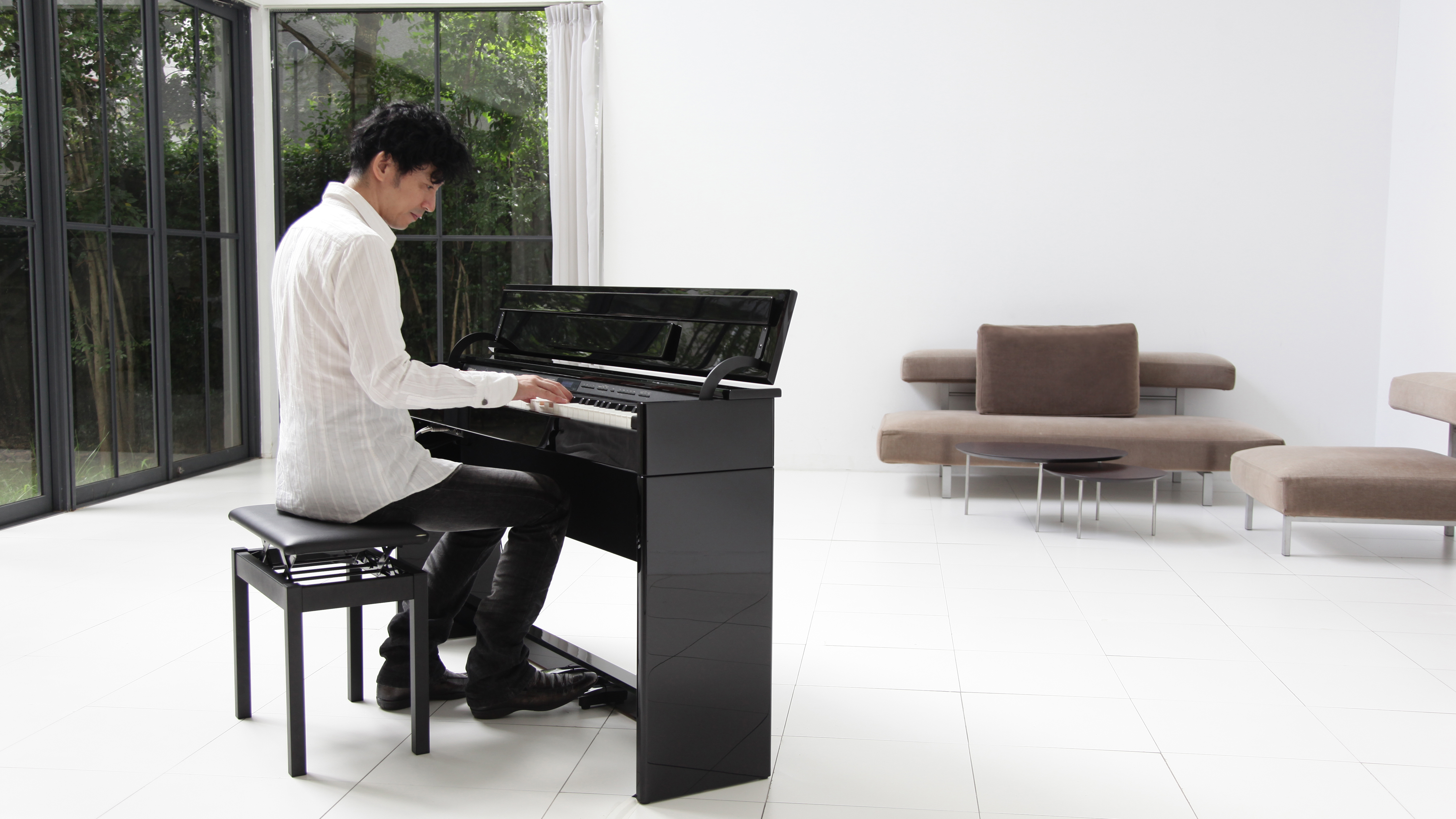
It's fair to say Roland is a pioneer in the digital piano space. In 1974, the forward-thinking company introduced the first-ever touch-sensitive electric piano, an innovation that forever changed the face of digital pianos. Today, Roland continues to push boundaries, offering pianos for every budget, style and musical aspiration. So, if you're looking for a stunning high-tech piano that sounds just as good as it looks, my in-depth guide to the best Roland digital pianos is sure to help you find the perfect model for your needs.
Now, as a professional music gear reviewer and writer, I've had the privilege of immersing myself in the world of musical instruments, but my journey began long before that. I spent nearly a decade selling digital pianos in a music store, which gave me invaluable insights into what makes a truly great instrument.
As you'd expect, Roland’s piano range is wide and varied, catering to every type of player, regardless of where you are in your playing career. Throughout my years in the industry, I’ve seen how beginners of all ages love the celebrated RP and F series. The fantastic HP range is a welcome addition to any pianist's home - and is what I use personally - while the luxurious LX and GP series are ideal for the more advanced players looking to make a statement.
My top pick is currently the Roland HP702. For me, this piano is super playable, sounds fantastic and is surprisingly affordable. For those seeking a more premium option, look no further than the Roland LX708. This piano is simply stunning in every way, but be warned, an instrument this good comes with a sizable price tag. Lastly, for beginners, I have to recommend the Roland F701. This piano is accessible, playable and affordable - everything you need in a good beginner instrument.
So, whether you’re a complete novice or a seasoned professional, I invite you to join me on this journey through the greatest pianos produced by this iconic Japanese electronic instrument manufacturer.
Our top picks
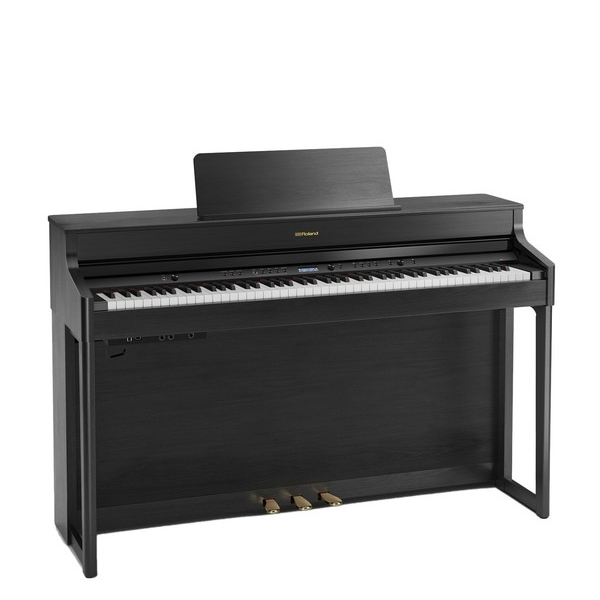
The Roland HP range of digital console pianos targets home users, beginners, and students, featuring two models: the HP702 and HP704. Now, while both use Roland’s SuperNATURAL acoustic piano technology, the HP-704 offers an upgraded keyboard and a more powerful speaker system. However, due to a sizeable price difference between the two, I've chosen the HP702 as my top choice.
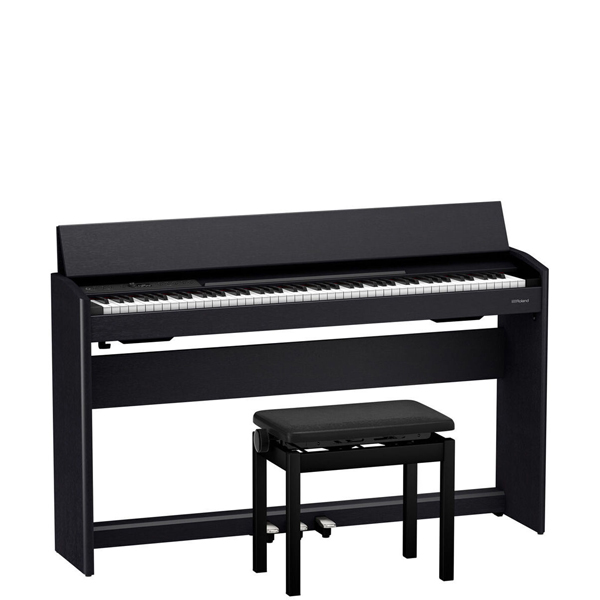
It will come as no surprise that at the core of the F701 is Roland's SuperNATURAL piano modelling, as well as the PHA-4 standard keyboard. This tried and tested combination provides good sensitivity, dynamics and expression. The F701's understated cabinet design enhances its appeal, with the rear connections are neatly arranged, allowing the piano to face any direction without unsightly wires.
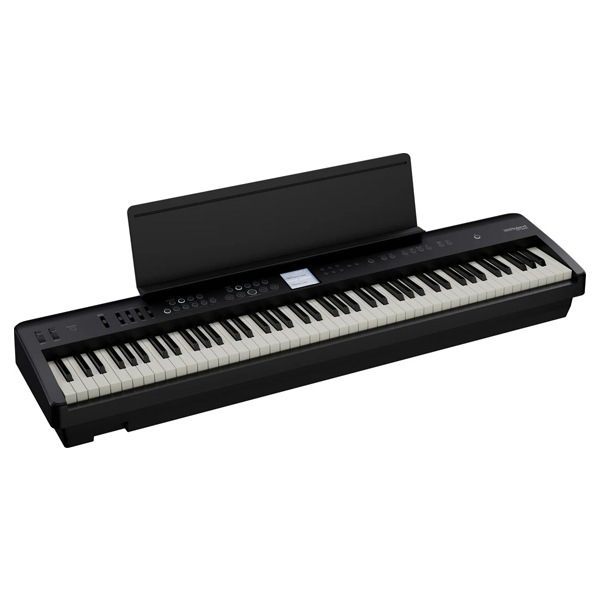
The Roland FP-E50 is a versatile digital piano that cleverly blends features from home keyboards, synths, and stage pianos. Designed for both casual players and those seeking performance capabilities, it offers a rich array of functions that you simply can't find on other digital pianos. I think this is the perfect intermediate piano for players looking to dive deeper into new sounds and experiment with accompaniment.
Load the next 3 pianos ↓
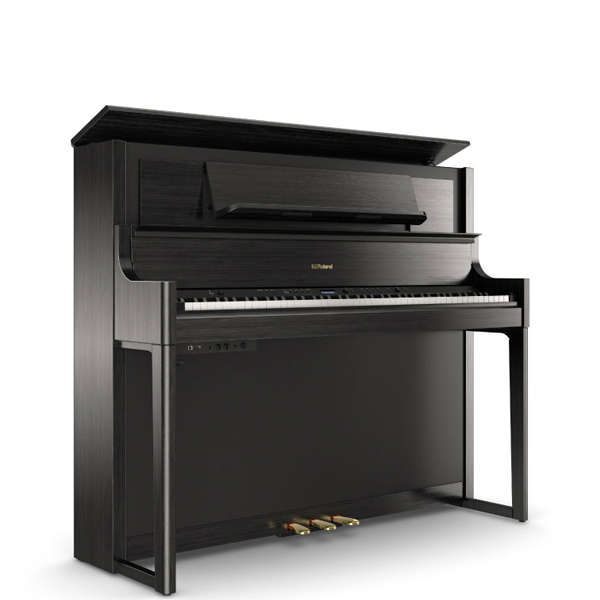
The gorgeous and grand LX708 towers above all others in its series with its taller cabinet, resulting in quite possibly the best-looking piano in the rather packed Roland catalogue. Its elegant and sleek design means it's sure to be a stunning centrepiece for any room.
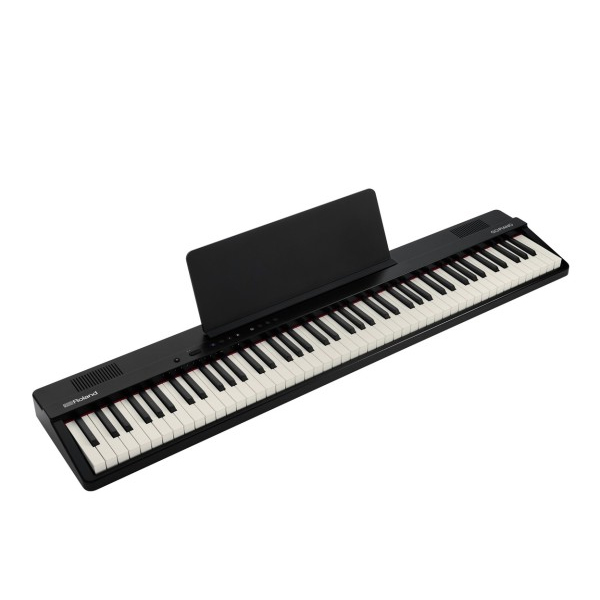
Roland's latest release, the GO:PIANO 88PX, builds upon the success of its predecessor, the GO:PIANO 88, offering a compact, ultra-portable digital piano designed for both beginners and advanced players.
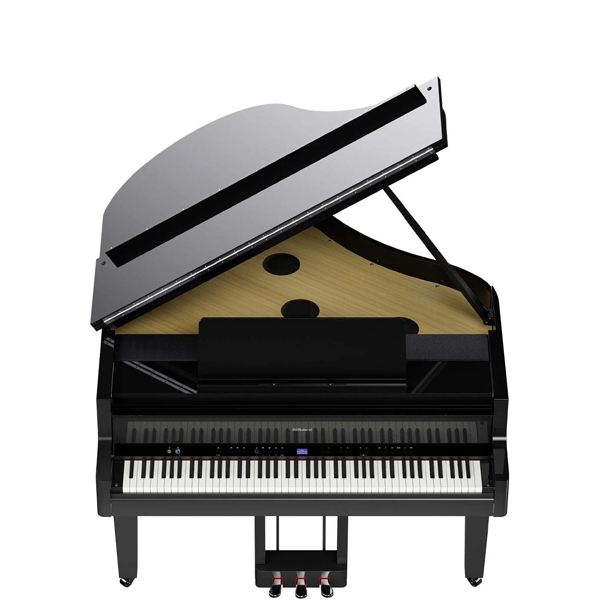
There is something so inspiring about a grand piano. The look, the feel and that all-encompassing sound just makes you want to play and play. Now, you don't need me to tell you that owning a real grand piano isn't a walk in the park.
Best overall
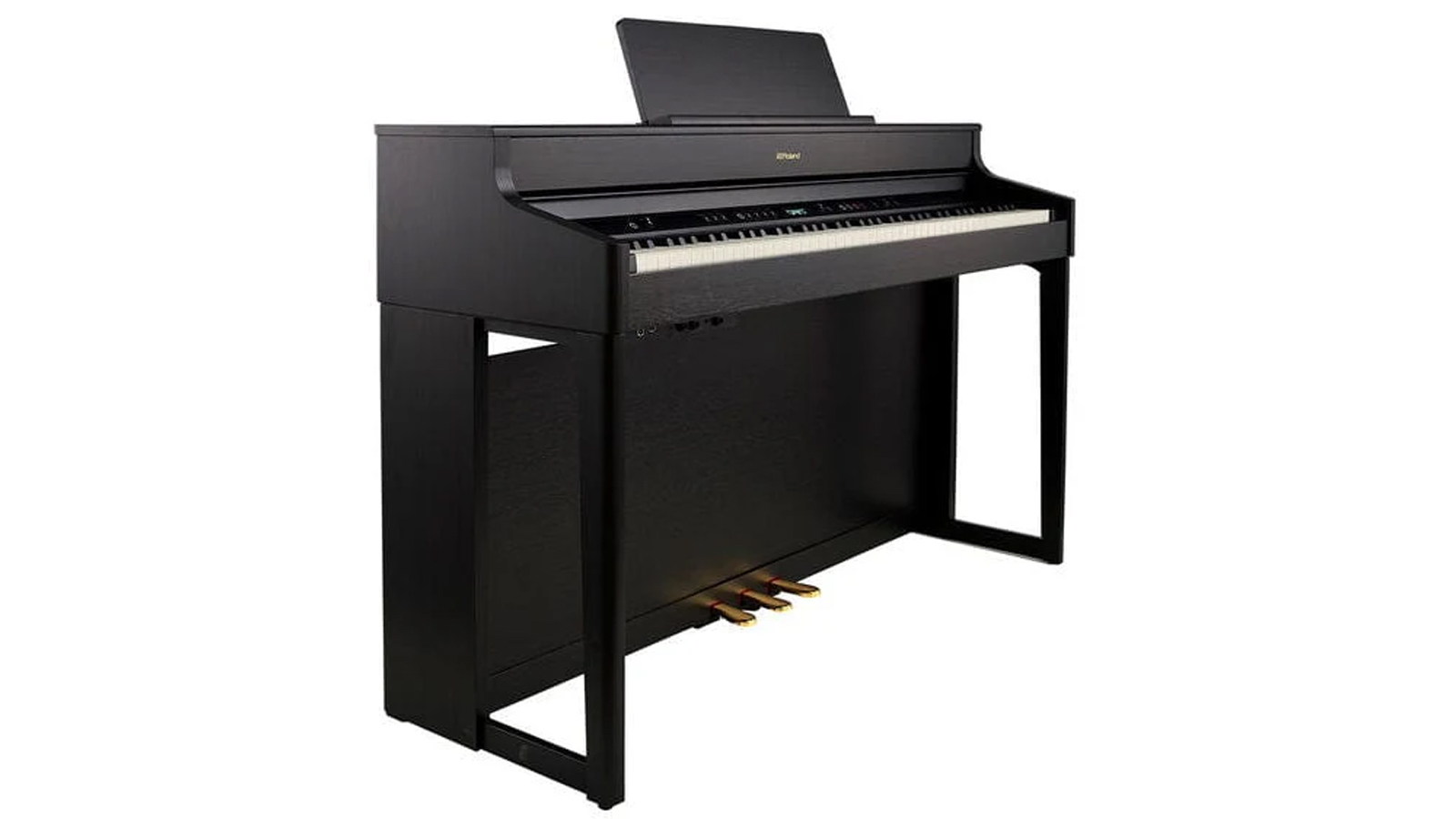
1. Roland HP702
Our expert review:
Specifications
Reasons to buy
Reasons to avoid
To me, this is the ideal model for families seeking a piano that suits every level of player in the home, from young beginners to more experienced adults.
✅ Buy if you want a reasonably priced home piano: Despite its modest price, this piano more than delivers on sound, feel and looks.
❌ Avoid if you are short on space: Okay, this isn’t the largest piano in the world, but if you are short on space, you’ll want to try the slimmer Roland F701.
Build: ★★★★☆
Feel: ★★★★ ½
Sound: ★★★★ ½
Overall: ★★★★ ½
The Roland HP range of digital pianos targets home users, beginners, and students, featuring two models: the HP-702 and HP-704. Now, while both use Roland’s SuperNATURAL acoustic piano technology, the HP-704 offers an upgraded keyboard and a more powerful speaker system. However, due to a sizeable price difference between the two, I've chosen the HP-702 as my top choice.
The HP-702 is equipped with the PHA-4 Standard keyboard, Progressive Damper Action pedals, and over 320 sounds. It also supports Bluetooth connectivity for audio playback from mobile devices. Available in four wood finishes, it perfectly resembles a compact upright piano and is incredibly user-friendly.
Build: The HP-702 features a traditional wooden cabinet design and a comprehensive interface with a retractable keyboard cover. Controls include volume, metronome settings, and sound selection, arranged around a clear OLED display. Like all Roland products, this piano is built to last, and once assembled, it feels sturdy, robust, and very well-made.
Performance: The PHA-4 keyboard offers natural escapement and progressive weighting, making it highly playable. This is a key action found in a number of Roland models, and while it may not be the most realistic when compared to heavier hammer-action pianos, it's a firm favourite of mine. I love how smooth and responsive this keybed is under my fingers.
Sound: In our review, we praise this piano's tone, saying, "In terms of sound quality, the HP702’s wooden cabinet and room-filling dual 12W speaker system showcase the SuperNATURAL modelled acoustic piano tones at their best, delivering a warm, bright and faithfully-acoustic tone that’s incredibly close to the authentic acoustic piano experience." Of course, the 3D Ambience effect only enhances the experience with headphones on, creating an immersive playing experience that's hard to beat at this price point.

"If you want a great-sounding, cutting-edge digital piano with an elegant, traditional look and a great key action, the HP702 needs to be somewhere near the top of your list."
Read my full Roland HP702 review
Best for beginners
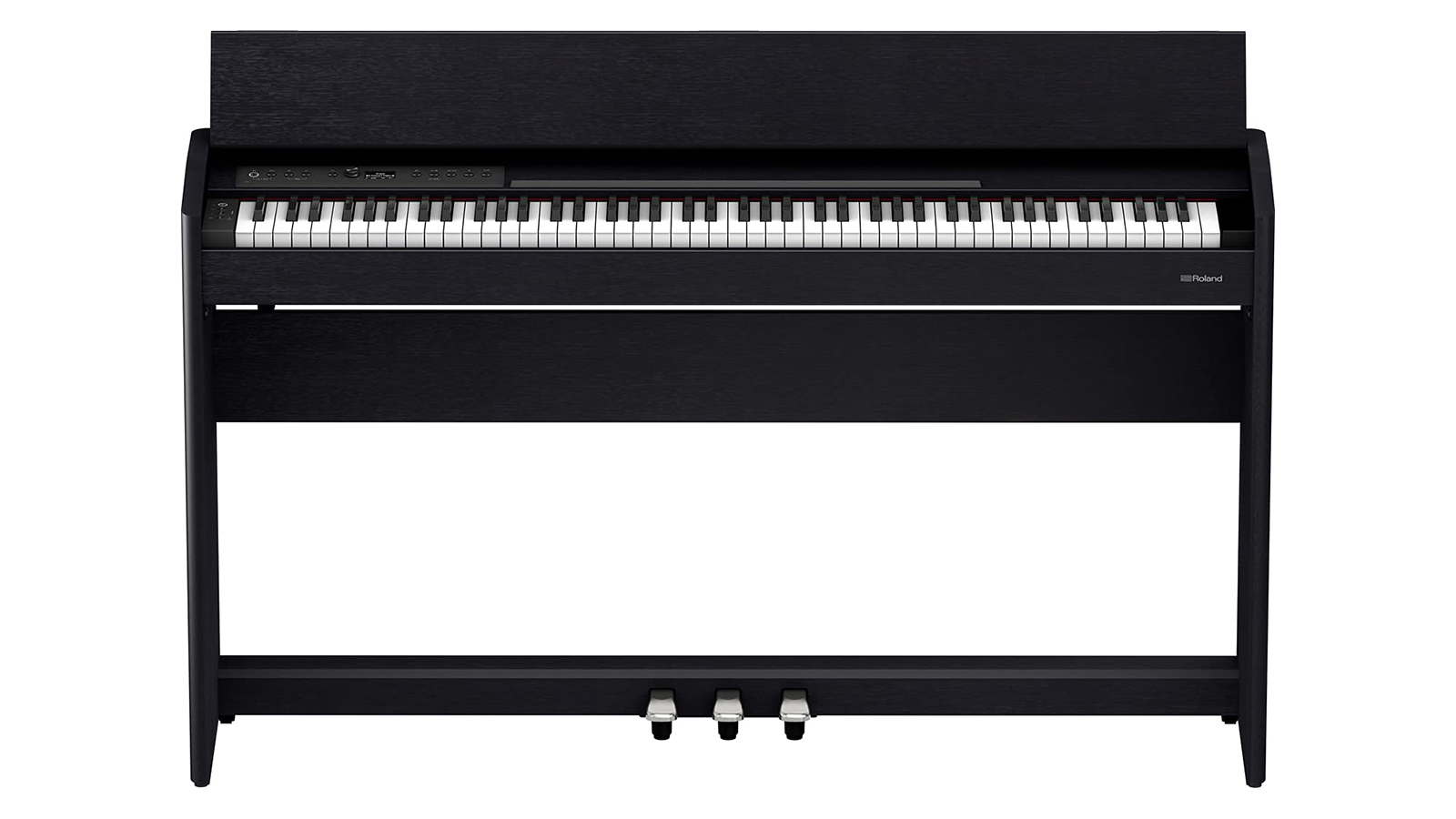
2. Roland F701
Our expert review:
Specifications
Reasons to buy
Reasons to avoid
If you are a beginner or a player tight on space, this is the piano for you.
✅ Buy if you want superb tones: For me, Roland has always had a superior tone, and even the entry-level pianos sound fantastic.
❌ Avoid if you prefer a full-sized upright: This is a fairly slim model; if you want a larger cabinet, consider the HP702.
Build: ★★★★☆
Feel: ★★★★ ½
Sound: ★★★★ ½
Overall: ★★★★ ½
The Roland RP701 is a value-oriented digital piano designed for home players, beginners, and students. It sits between the more advanced HP702 and entry-level models like R107 and F107. With a classic upright piano aesthetic, it offers a slim and affordable option for those seeking a quality small upright without the high price tag.
Build: This model features a full-size console design with a real wood cabinet that is available in four finishes: Dark Rosewood, Contemporary Black, Light Oak, and White. In my experience, this is a very straightforward piano to build and assemble.
Performance: The PHA-4 Standard keyboard found on the RP701 is the same as that found on the majority of Roland's entry-level and mid-range digital pianos. Its implementation here is excellent, as usual - playable and responsive. For beginners who may find the action a little too heavy, the Piano Designer mode's key touch setting can be adjusted to make things easier.
Sound: With 324 onboard sounds and Bluetooth audio streaming, the RP701 excels in the sound department. While it features sampled attack transients for its piano sound, it doesn't offer the same range of expressiveness as the HP702. Still, its nuanced sounds make it a rewarding choice for budding pianists.
Best intermediate
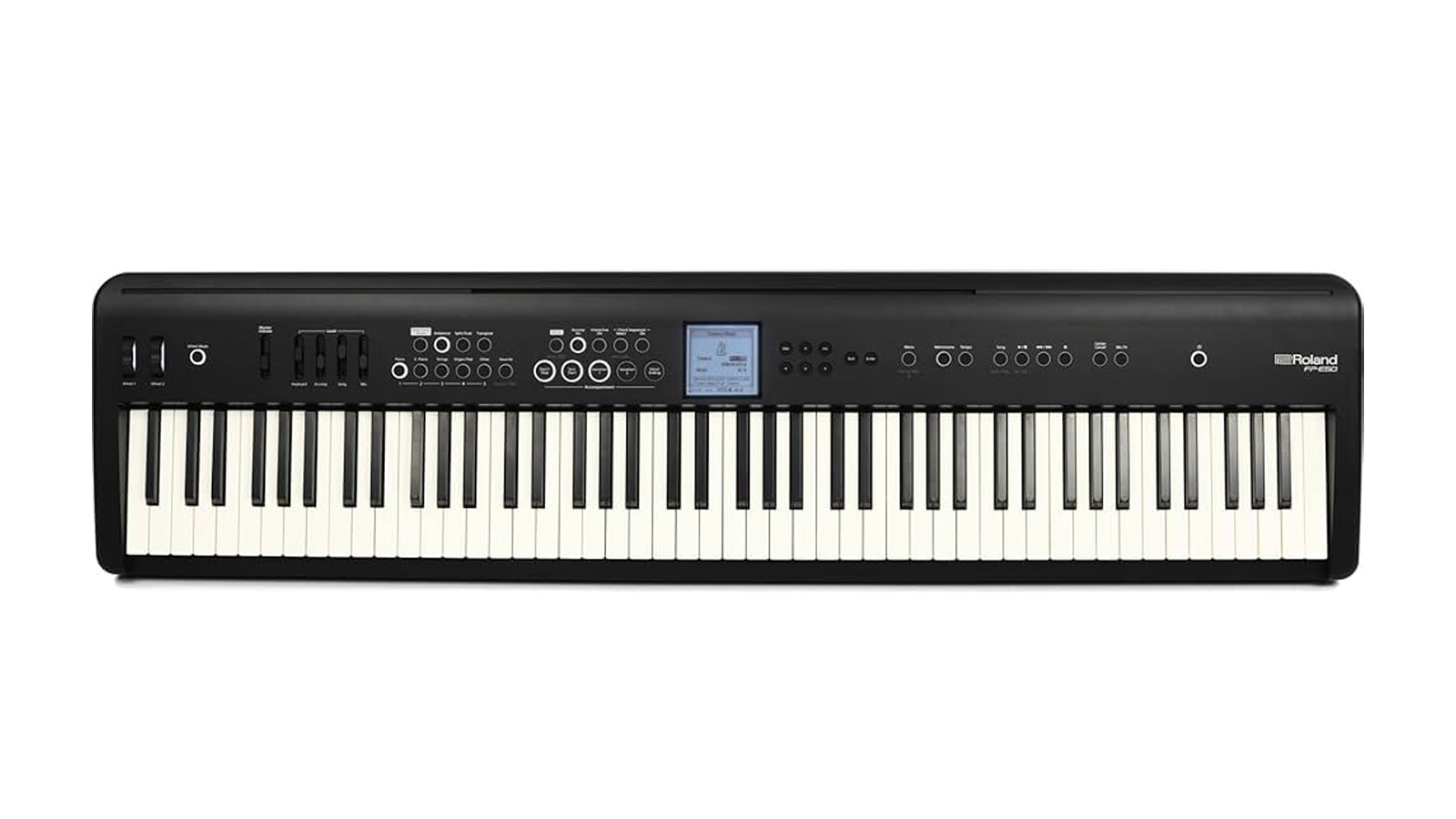
3. Roland FP-E50
Our expert review:
Specifications
Reasons to buy
Reasons to avoid
Been playing a while and looking to take it to the next level? Well, then the FP-E50 is the piano to do that.
✅ Buy if you want more sounds and features: This piano goes way beyond what a typical digital piano is capable of, with synth tones, auto accompaniment and even vocal effects.
❌ Avoid if you want a standard digital piano: Won’t use all the extra features? Well, you’ll want to go for a standard digital piano.
Build: ★★★★☆
Feel: ★★★★ ½
Sound: ★★★★ ½
Overall: ★★★★ ½
The Roland FP-E50 is a versatile digital piano that cleverly blends features from home keyboards, synths, and stage pianos. Designed for both casual players and those seeking performance capabilities, it offers a rich array of functions that you simply can't find on other digital pianos. I think this is the perfect intermediate piano for players looking to dive deeper into new sounds and experiment with accompaniment.
Equipped with a PHA-4 keybed and Roland’s ZEN-Core engine, the FP-E50 is half synth, half home piano - and for that reason, we love it. It features 177 preset styles for automatic accompaniment, an interactive function that adjusts backing tracks based on your play, and a chord sequencer with 140 presets. Additionally, it includes a mic input with vocal effects and Bluetooth audio.
Build Quality: The FP-E50's build quality is commendable, featuring a sleek design that certainly wouldn’t look out of place in any home. Its downward-facing 11-watt speakers provide adequate volume, although they may sound boomy at high levels.
Performance: Speaking on the key action in our full review, we said, "This action might feel heavy at first if you’re graduating from a home keyboard, but stick with it and let it loosen up. You’ll be rewarded with a fine playing experience that allows for plenty of expression, even if it’s not quite on a par with the PHA-50 keybed that you’ll find in Roland’s more expensive pianos."
Sound: The sound quality is impressive, thanks to the latest ZEN-Core engine, delivering a wide range of acoustic instruments, synth tones, and drum sets. The auto-accompaniment features add an entertaining dimension, making it ideal for solo jam sessions

"Maybe not the coolest keyboard in Roland’s roster, but if you value sound quality, ease-of-use and fun, it’s in a class of its own."
Read my full Roland FP-E50 review
Best for professionals
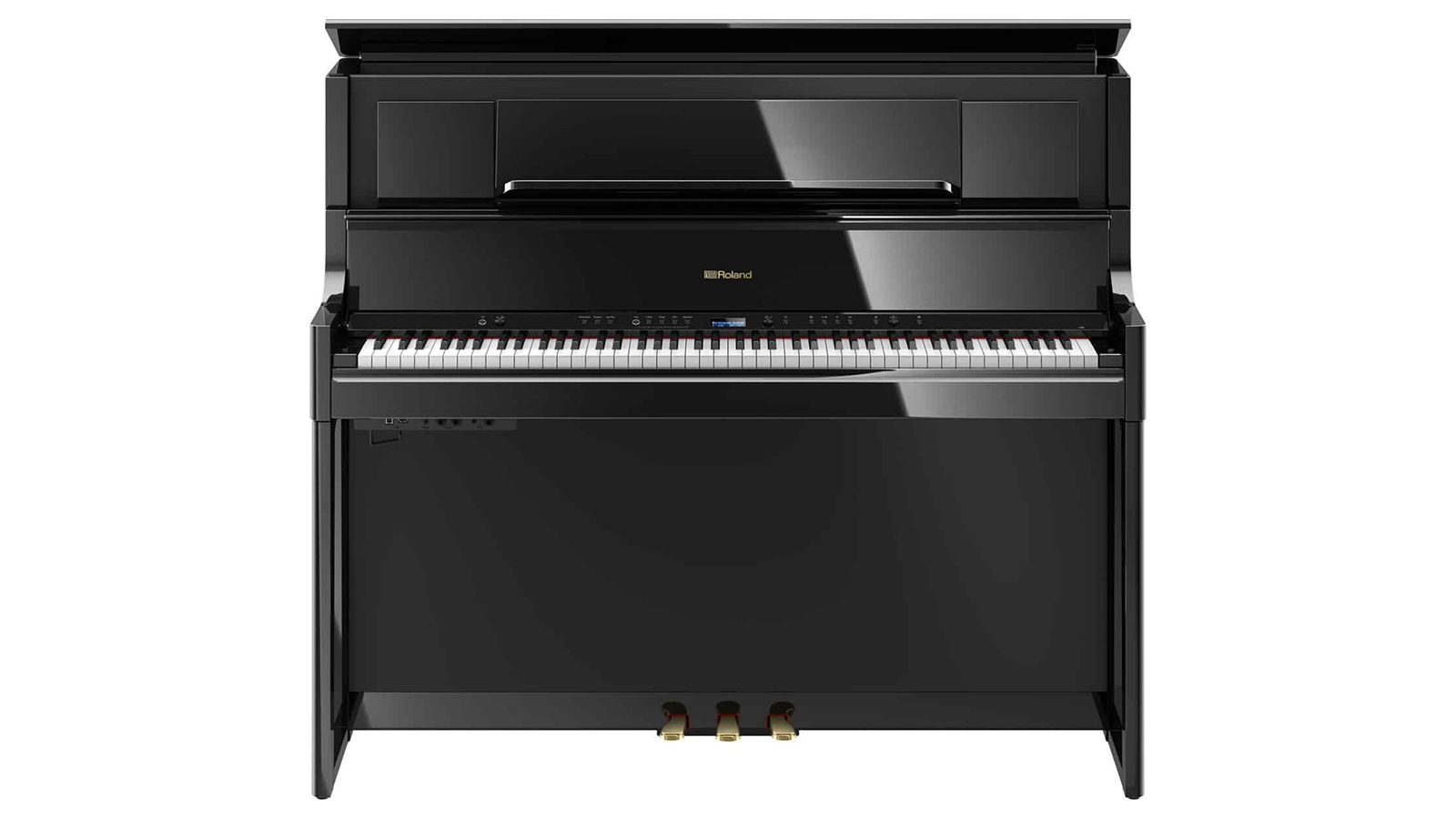
4. Roland LX708
Our expert review:
Specifications
Reasons to buy
Reasons to avoid
This is a serious piano for serious pianists – and best appreciated by experienced players.
✅ Buy if you are seeking an acoustic-like feel: The Hybrid Grand Keyboard delivers a truly authentic playing experience.
❌ Avoid if you're on a budget: Quality like this doesn't come cheap. This is certainly not a piano for those on a budget.
Build: ★★★★½
Feel: ★★★★★
Sound: ★★★★★
Overall: ★★★★★
The gorgeous and grand LX708 towers above all others in its series with its taller cabinet, resulting in quite possibly the best-looking piano in the rather packed Roland catalogue. Its elegant and sleek design means it's sure to be a stunning centrepiece for any room.
Build: Housed inside this extravagant cabinet is Roland's Hybrid Grand Keyboard action, which combines the nuanced touch of an acoustic piano with cutting-edge digital technology. The keybed features weighted keys that respond effortlessly to a light touch, while the Unique Key Vibration technology replicates the slight micro-movements felt when playing real acoustic pianos. The attention to detail in the build quality is exceptional, reflecting craftsmanship that goes beyond aesthetics to enhance the playing experience.
Performance: For me, the LX708 offers an incredibly lifelike playing experience that is almost indistinguishable from the real thing, making it a total joy to play. The responsive keys allow for expressive playing, whether tackling intricate classical pieces or dynamic contemporary compositions.
Sound: Fortunately, this luxurious piano boasts a sound to match its charming appearance and stellar playability. The piano's Acoustic Projection System is seriously powerful, producing rich and resonant tones that fill any space. The intelligently placed speakers ensure clarity across the full dynamic range, from the softest whispers to thunderous crescendos.
Best portable
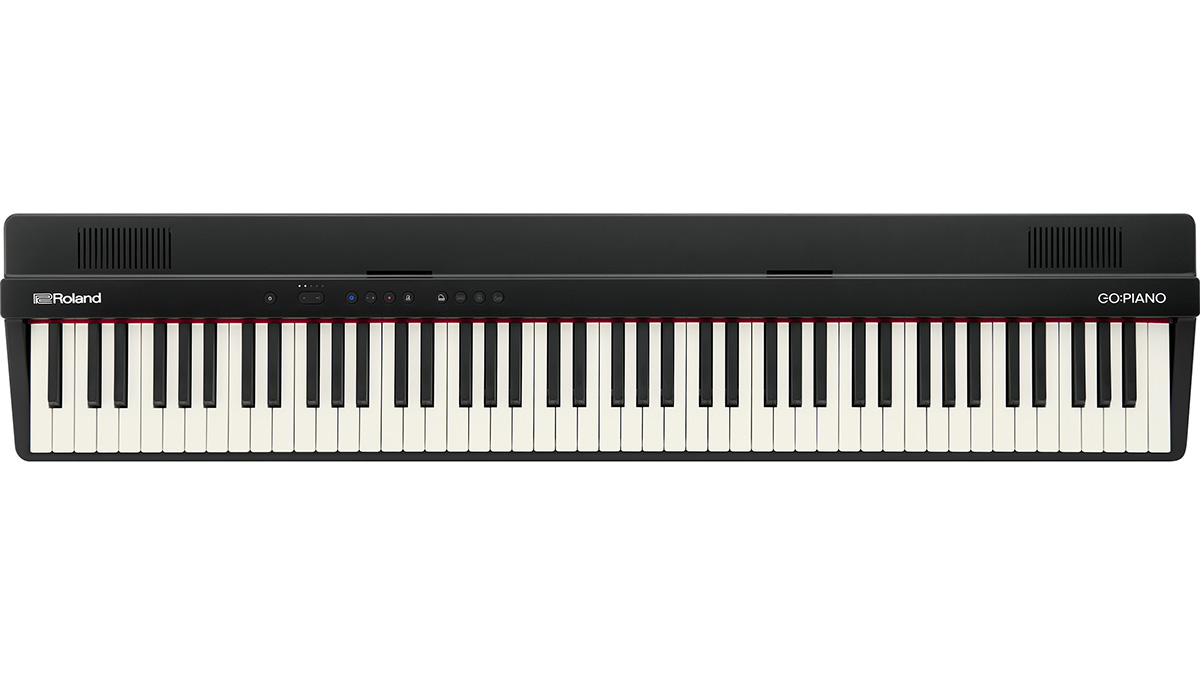
5. Roland GO:PIANO 88PX
Our expert review:
Specifications
Reasons to buy
Reasons to avoid
While more advanced players could certainly get a lot out of the 88PX, I think it’s best suited for beginners and players new to the instrument.
✅ Buy if you need a portable piano: Looking to take your piano to lessons, school or band rehearsals? Well, this is the Roland for you.
❌ Avoid if you want fully weighted keys: Unfortunately, this piano doesn’t have fully weighted keys.
Build: ★★★★☆
Feel: ★★★★☆
Sound: ★★★★☆
Overall: ★★★★☆
Roland's latest release, the GO:PIANO 88PX, builds upon the success of its predecessor, the GO:PIANO 88, offering a compact, ultra-portable digital piano designed for both beginners and advanced players. With a focus on playability, realistic sound, and intuitive usability, the GO 88PX is my top choice for players on the move.
Weighing just 5.8 kg and measuring 128 cm by 27.6 cm, the GO 88PX is highly transportable, powered by either 8 AA batteries or an AC adapter. It features 88 touch-sensitive keys with an ivory-textured surface, improved speaker technology, Bluetooth connectivity, and a variety of built-in sounds, including a new grand piano sound. The model also supports half-damper functionality and includes a one-year membership to Roland Cloud Core.
Build: Okay, this piano may be lightweight, but thankfully, it still feels as robust and sturdy as any other Roland product. I also like the sleek and minimal design.
Performance: Overall, the keys feel remarkably good under my fingers with a comfortable ivory texture on the white keys. However, where the new Roland GO:PIANO 88 will fall short for some is in its key action. While the keys aren’t weighted, we found them to be quite heavy and at times awkward to play. While it worked fine for louder, more energetic passages, we struggled to achieve soft and expressive nuances.
Sound: Its sound engine utilises sympathetic resonance modelling for a more natural sound and offers 40 built-in voices. While polyphony is now 64 notes, I never had a problem with the reduced polyphony - 64 is certainly plenty for most players.

"Roland's new GO:PIANO 88PX is one of the most compact and lightweight 88-key digital pianos on the market. Despite its size, it delivers impressive audio quality and premium functions as well as featuring a good selection of inspired sounds."
Read my full Roland GO:PIANO 88PX review
Best grand piano
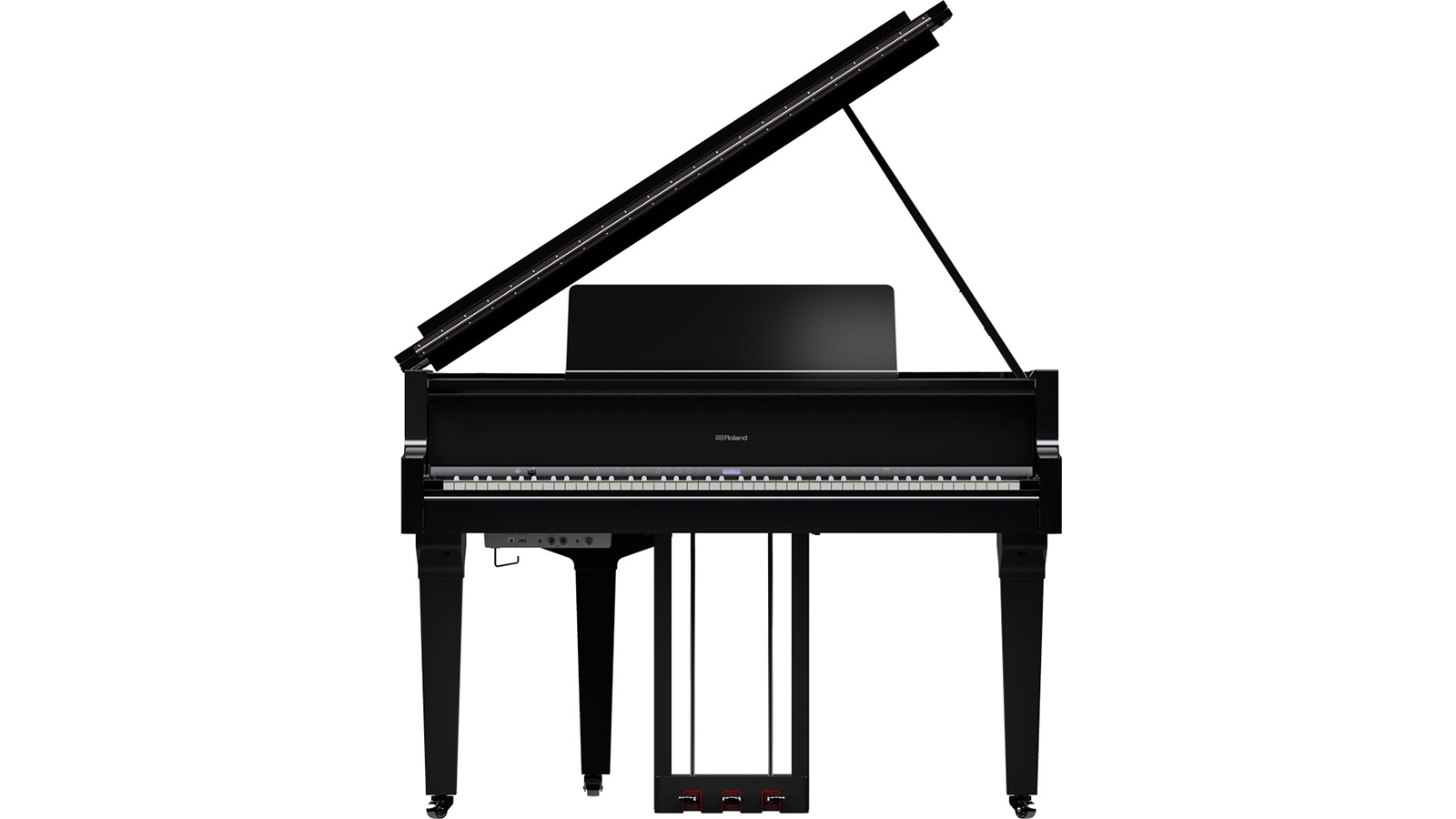
6. Roland GP-9M
Our expert review:
Specifications
Reasons to buy
Reasons to avoid
This instrument is for people who want to make a statement with their piano choice – oh, and those with a big enough room to house it.
✅ Buy if you don't want to compromise on looks, tone or feel: This piano is simply gorgeous in every way, from its stunning good looks to its life-like feel and stellar tone.
❌ Avoid if you don’t have space for a grand piano: Obviously, this is a large piano, and it needs a fairly big room to house it.
Build: ★★★★½
Feel: ★★★★★
Sound: ★★★★★
Overall: ★★★★★
There is something so inspiring about a grand piano. The look, the feel and that all-encompassing sound just makes you want to play and play. Now, you don't need me to tell you that owning a real grand piano isn't a walk in the park. They require a lot of ongoing maintenance to keep them playing their best, they weigh more than a small car and usually have a pretty hefty price tag. Luckily, Roland has a solution - the GP-9M.
Build: Simply put, this model is built like a tank. Its large frame isn't just grand, it feels fantastic and suitably luxurious. The GP-9M is Roland's premier grand piano and comes fully loaded with the best piano technology Roland has to offer. At the heart of this striking instrument is what Roland refers to as the "Piano Reality approach". Simply put, this is an ecosystem of connected technologies that combine to perfectly recreate the sound and feel of an authentic acoustic grand piano.
Performance: While the GP-9M shares many of the same features as others in the GP range, it does bring a few unique features to the table, such as moving keys, audio outputs and a microphone input for singing along through the onboard speaker system.
Sound: Roland's "Piano Reality" approach is an advanced ecosystem of connected technologies that work together to recreate the sound and feel of an authentic acoustic grand piano. The sound quality is exceptional, delivering rich, dynamic tones that resonate beautifully through the onboard speaker system. Whether you're playing classical pieces or contemporary songs, the GP-9M provides an immersive auditory experience that truly satisfies any pianist's aspirations.
Spec comparison
Model | Type | Number of sounds | Dimensions | Weight |
|---|---|---|---|---|
Roland HP702 | Upright | 324 | W1,377 x D468 x H1,0673mm | 54.4kg |
Roland F701 | Slimline | 324 | W1360 x D345 x H913mm | 36kg |
Roland FP-E50 | Stage/Slimline | 1018 | W1,300 x D322 x H174mm | 17.1kg |
Roland LX708 | Upright | 324 | W1395 x D502 x H1253mm | 110.5kg |
Roland GO:PIANO 88PX | Stage/Portable | 40 | W1,280 x D309 x H245mm | 5.8kg |
Roland GP-9M | Mini Grand | 324 | W1,445 x D1,501 x H91,787mm | 188kg |
How to choose
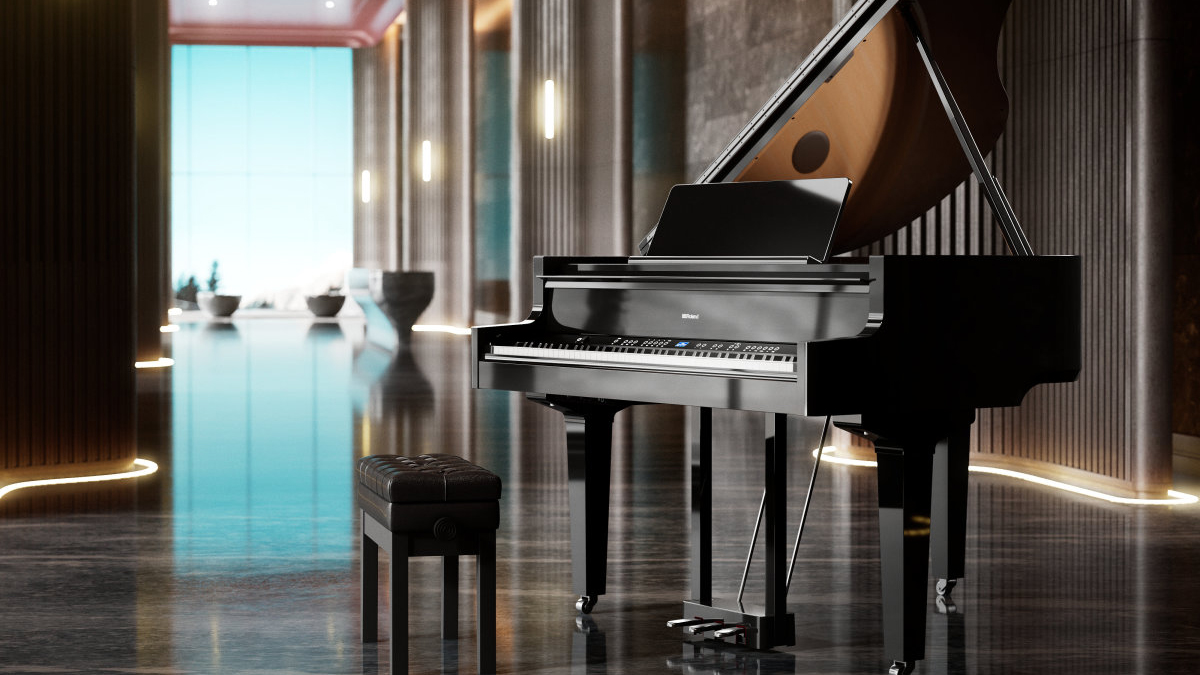
Much like many other piano heavyweights, the Roland range can be broken down into a few categories - stage pianos, portable pianos, upright pianos, premium upright pianos and grand pianos.
So, when deciding which is the best Roland piano for your needs, you'll want to first determine what you want a digital piano for, i.e. recreational playing, performance or recording.
If you are seeking a piano for gigging or simply moving around easily, a stage piano or portable piano is the perfect option. These lightweight instruments are designed specifically for this purpose, and Roland has plenty to choose from. Whether it's the revolutionary V-Piano, the beloved RD series or the beginner-friendly FP range, there is sure to be a portable piano for you.
Perhaps your new piano is going to be a permanent feature in your home. Well, in that case, a digital upright could be the best option. These pianos look much more like their acoustic brethren and are sure to be the centrepiece of any home. If this sounds like the piano style you are after, you'll want to check out the LX, HP, RP and F ranges.
Lastly, if you want to go big and have the space, then the grand piano is the instrument for you. Roland's acclaimed GP series showcases the very best advancements in technology, offering an out-of-this-world playing experience and a lavish look that is sure to make a statement in any room.
FAQs
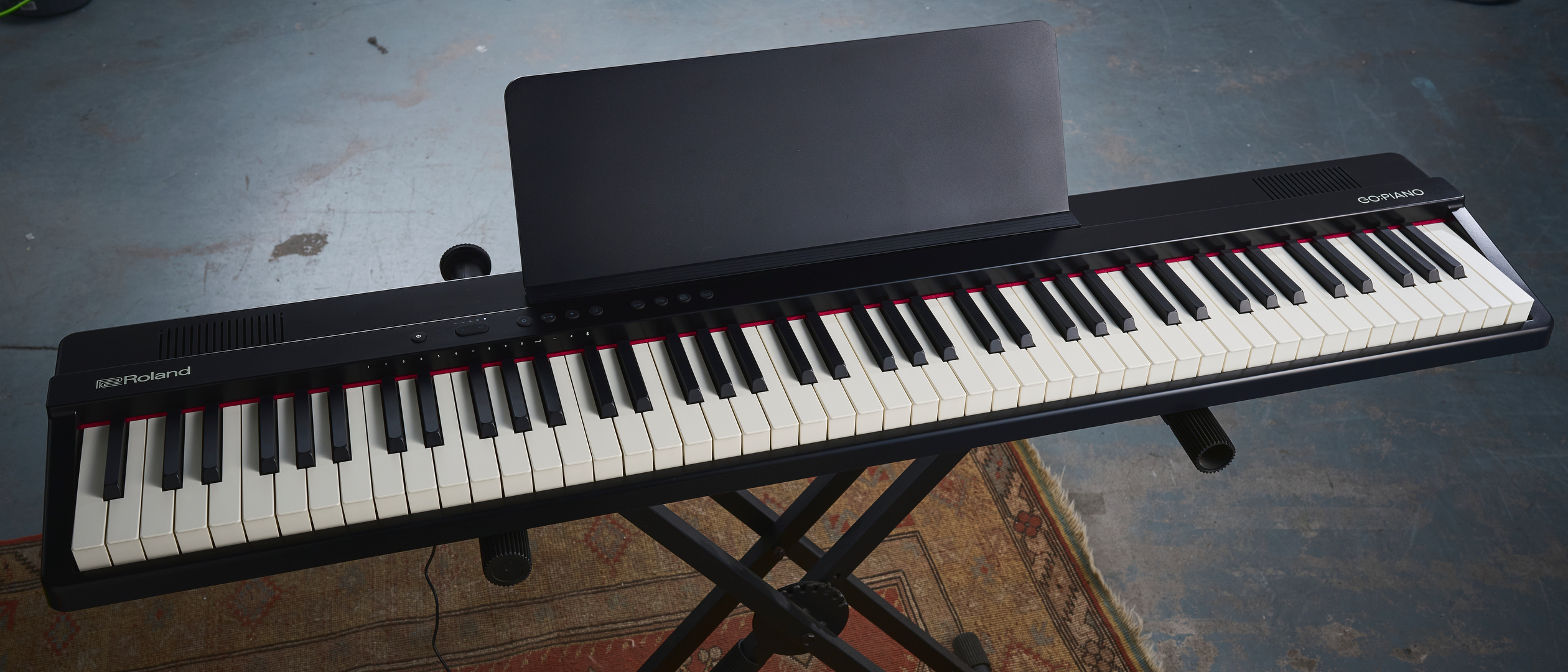
Who are Roland?
Hailing from Osaka, Japan, Roland is regarded as one of the most innovative musical instrument manufacturers ever - not only in the digital piano space. From launching Japan's first electronic pianos in '73 to being responsible for some of the most popular synthesizers ever made, Roland has consistently pushed the boundaries of what is possible with a key-based instrument.
Today Roland's piano range has blossomed into a vast array of models that feature everything from the best beginner digital pianos money can buy to luxurious high-tech options that show just what is possible with this forward-thinking technology.
Why should I buy a digital piano?
It may be hard to believe, but some people still maintain that to learn the piano effectively, one must use an acoustic model. While this perspective was more common a couple of decades ago, the truth is that digital pianos have advanced significantly since then, with many higher-end options now closely resembling traditional pianos in terms of feel and sound.
Here are a few reasons why you should choose digital over acoustic.
No tuning: One of the most significant benefits of digital pianos is that they don’t need tuning, which can lead to substantial savings over time. Plus, no tuning means you can move them freely without worrying about them going out of tune.
You can use headphones: Probably the best benefit of a digital piano is the ability to use headphones. Headphone outputs allow for silent practice, meaning you can play day or night, and you won't disturb your entire house.
More sounds: An acoustic has only one sound – piano. But the digital equivalent comes loaded with a variety of tones that not only enhance the learning experience but can make playing more enjoyable and engaging.
Modern connectivity: Additionally, many digital pianos can connect to computers or tablets via cable or Bluetooth, allowing them to function as MIDI controllers or facilitate online lessons. To learn more about this, check out our guide on connecting a digital piano to your computer.
Is it difficult to buy a digital piano online?
Thinking about ordering a digital piano online? Don't let the idea intimidate you. While pianos are big, most reputable retailers offer delivery and even assembly services, though there might be an extra fee.
When your new piano arrives, expect some hefty boxes, so it’s a good idea to have a friend or two on hand to help bring it inside. Two people can manage most digital pianos, but an extra set of hands can make it easier.
Once you’re inside, putting it together is a breeze. You’ll mainly be attaching the legs and pedalboard, which is similar to assembling flat-pack furniture. If you’ve tackled building a set of drawers, you can definitely handle this - trust me.
Find out more in our guide to ordering a piano online.
Meet the experts
☑️ Established 2007
☑️ 2.9 million monthly users globally
☑️ 9,500+ reviews on-site
With more than 17 years of experience, MusicRadar is the premier music-making website in the world. Run by musicians for musicians, we offer expertly written gear round-ups and high-quality, authoritative reviews by an extensive team of highly experienced industry professionals.
Below you'll find more information on the expert authors of this guide.

Daryl is a Senior Deals Writer at MusicRadar, and is responsible for writing and maintaining buyer's guides on the site as well as testing out products for reviews. Before writing for MusicRadar, Daryl worked for many years in music retail, helping musicians of all ages find the best gear for them. Whether it was a beginner's first keyboard or a top-of-the-range digital piano for the pros, Daryl was there to help steer players in the right direction.

Helen is a professional pianist and cellist. Performing in venues such as The Royal Albert Hall, O2 Arena and Monte Carlo Opera House, Helen also frequently collaborates with the biggest names in pop, having worked with Pink, Paloma Faith, Cher, Rod Stewart and Robbie Williams, amongst others, as well as recording for Pink Floyd's 2014 album The Endless River. She composes for Netflix and Amazon Prime, is solo cellist for Two Steps From Hell and enjoys international success with her electric string quartet, Escala.
How we choose the best Roland digital pianos
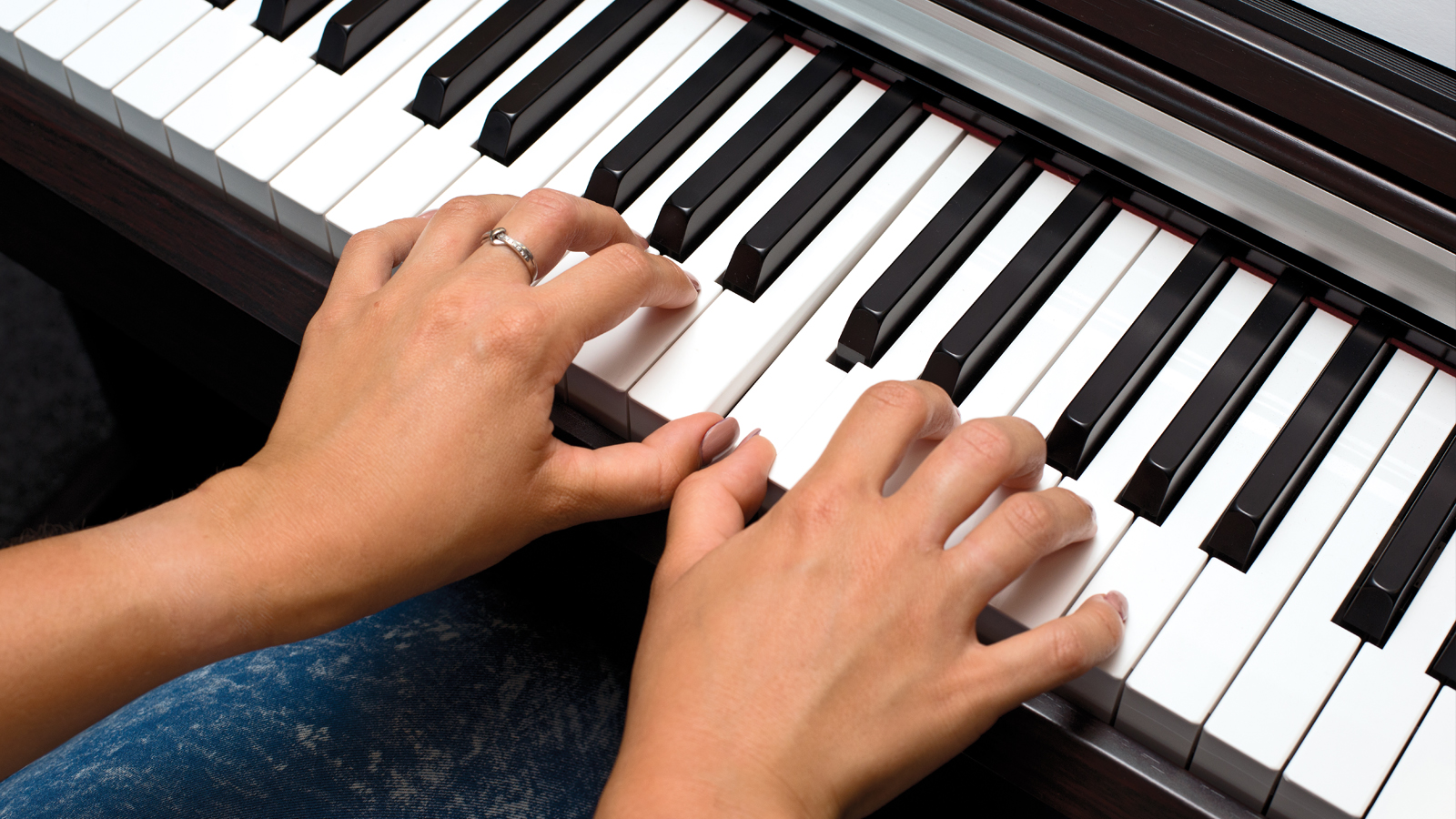
Here at MusicRadar, we are experts in our field, with many years of playing, creating and product testing between us. We live and breathe everything music gear related, and we draw on this knowledge and experience of using products in live, recording and rehearsal scenarios when selecting the products for our guides.
When choosing what we believe to be the best Roland digital pianos available right now, we combine our hands-on experience, user reviews and testimonies and engage in lengthy discussions with our editorial colleagues to reach a consensus about the top products in any given category.
First and foremost, we are musicians, and we want other players to find the right product for them. So we take into careful consideration everything from budget to feature set, ease of use and durability to come up with a list of what we can safely say are the best Roland digital pianos on the market right now.
Find out more about how we test music gear and services at MusicRadar.
About our videos
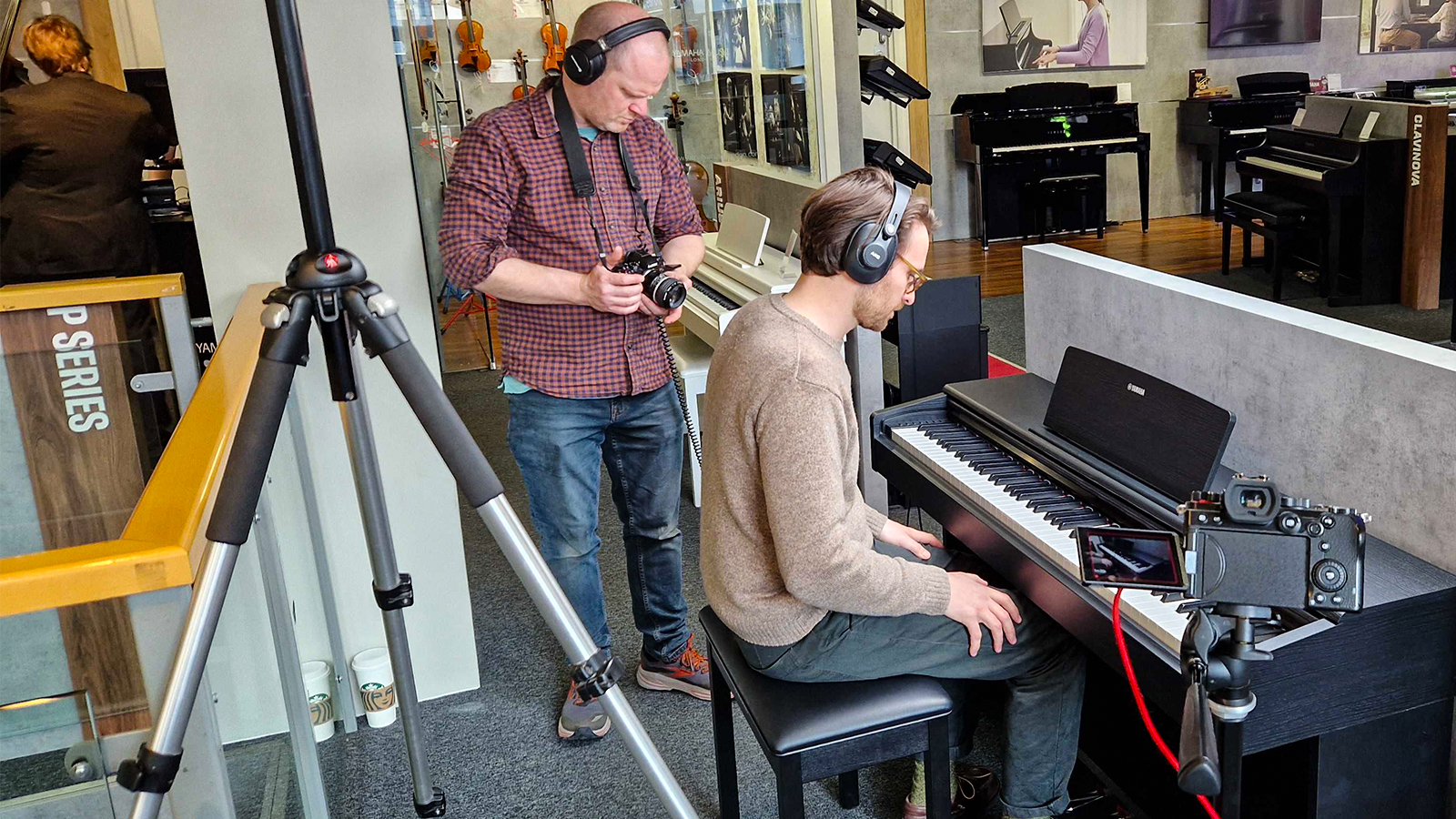
Filming locations: It’s a fact that most digital pianos are quite heavy, making them difficult instruemts to transport. Therefore, we employ two methods for recording our demo videos. When filming several models from the same brand, it’s more efficient to do so at a music shop or the brand’s showroom. This method enables us to record multiple pianos in one go without the hassle of shipping large instruments nationwide. However, if on-location shooting isn’t feasible, we film at our dedicated photo studio located in Bath, UK.
Capturing the audio: To keep things straightforward, we perform the same three pieces on every piano. We have specifically crafted the music for our demonstrations, creating three unique pieces designed to highlight the characteristics of each piano's sound. The audio is recorded either through the dedicated line output or the headphone jack. This approach maintains a clean audio signal, ensuring it mirrors the sound as it would through your own headphones, without being affected by the acoustics of the filming environment.
Post-processing: As you might anticipate, we do conduct a minimal amount of post-processing on the audio once recorded. We add a slight amount of compression to help maintain uniform volume levels throughout the demos, but we do not apply any EQ or post effects like reverb. The audio remains true to its captured state, with just enough compression to ensure consistency across various pianos.
Read more
MusicRadar's got your back
- Best piano benches: piano stools to suit all budgets
- Best headphones for digital piano
- Best digital pianos under $1,000/£1,000: budget-friendly pianos
- Best Yamaha digital pianos from every series
Want all the hottest music and gear news, reviews, deals, features and more, direct to your inbox? Sign up here.
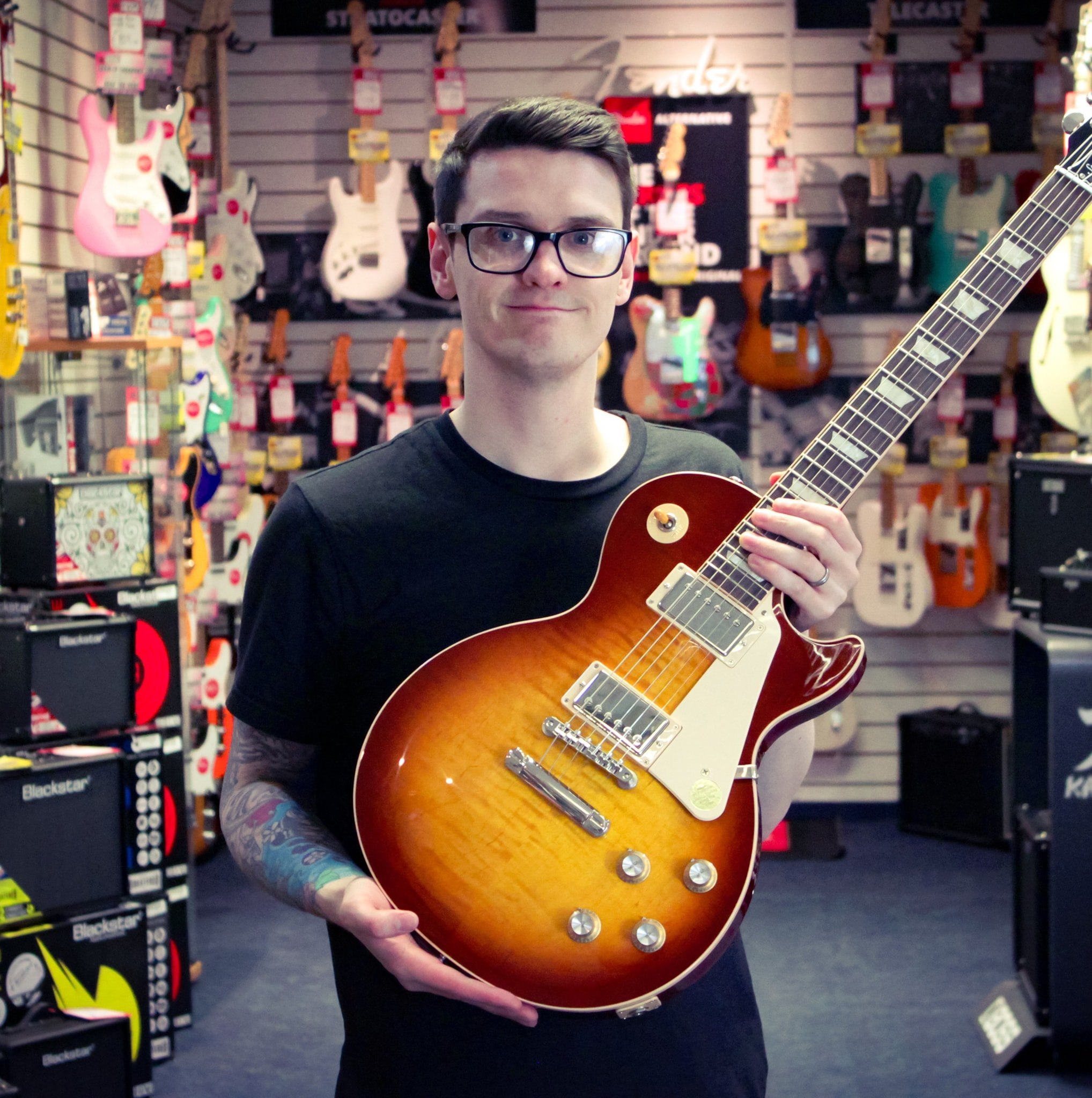
I'm a Senior Deals Writer at MusicRadar, and I'm responsible for writing and maintaining buyer's guides on the site. As part of my role, I also scour the internet for the best deals I can find on gear and get hands-on with the products for reviews. My gear reviews have been published in prominent publications, including Total Guitar, Guitarist, and Future Music, as well as Guitar World.com. I've also had the privilege of interviewing everyone from Slash to Yungblud, as well as members of Sum 41, Foo Fighters, The Offspring, and many more.
In a previous life, I worked in music retail, selling everything from digital pianos to electric guitars. I'm also a fully qualified sound engineer who holds a first-class Bachelor's degree in Creative Sound Production from the University of Abertay.